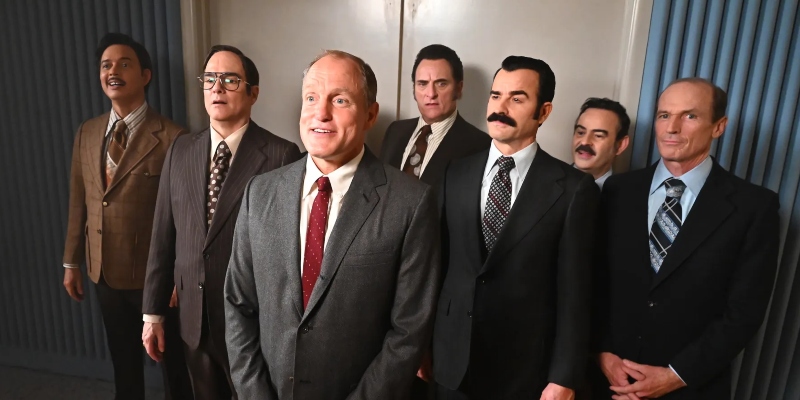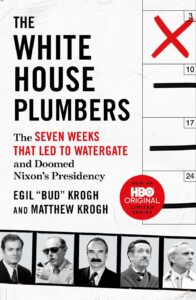
Finding the Humor in Watergate: Co-Author Matthew Krogh on the White House Plumbers Adaptation
(And What He'd Like to See Adapted Next)
The new HBO miniseries White House Plumbers—starring Woody Harrelson and Justin Theroux—is based on Matthew Krogh’s book of the same name (and its earlier iteration, Integrity), co-written with his father, Egil “Bud” Krogh, who was tasked by the Nixon Administration to put together a team to investigate the leak of the Pentagon Papers and other top secret government files. The series adaptation, created by Alex Gregory and Peter Huyck (Veep), finds the satire in one of the biggest conspiracies in presidential history.
With the series finale airing on May 29th, we asked Matthew Krogh about the experience of seeing the book adapted, his favorite book-to-screen adaptation, and more.
*
What’s the best part of having your work adapted for TV?
The humor that the writers revealed! What happened with Watergate was clearly a very serious matter for so many people, with my dad and family no exception. Even so, many of my dad’s stories of the time were hysterical or at least fascinating—facilitating Elvis’s meeting with President Nixon, the governor who walked into a closet instead of the exit door (and didn’t leave for 27 seconds), Liddy’s “gait altering device” and costuming during the Fielding break-in.
When we wrote the book, we were focused on the seven and a half weeks of questionable decision-making that laid the seeds for Nixon’s downfall, and also focused on lessons in ethical decision-making. So when the TV writers found the humor in the source material and rolled with it, it brought a whole different perspective.
If you could play a minor role in the adaptation, what would it be?
David Young was the day-to-day director of the Plumbers after the original team (Krogh, Young, Liddy, Hunt, Chenow) was assembled by Dad. Presumably to simplify the story for the show, his role was left out, but he was a key part of the original team. I think I’d enjoy playing him to imagine the day-to-day scene and really get inside what was happening in Room 16 in the Old Executive Office Building when the original team was operating together.
How was your relationship with the book changed during the process of adaptation?
When Dad and I wrote the book, the question we were really exploring was focused on how one can protect one’s own integrity and make good decisions even in high-pressure circumstances like the White House, during a time of war, with a mandate to do whatever needs doing to get the job done. And with that intention underlying the writing, we also asked, what unique contribution to the history of Watergate and the Nixon Administration can we make? That’s why we decided to focus on these seminal seven and half weeks, as a little discussed but ultimately trendsetting period of time.
But the producer and director, and the writers, looked into the book and found storylines to tease out and follow that make the TV series’ narrative so strong. For me, it was definitely a teachable moment witnessing how differently TV writers work with the kind of material the book represents and which facets they chose to focus on.
What’s your favorite book to screen adaptation (other than your own)?
The latest adaptation of Dune is certainly a favorite. I loved Herbert’s original trilogy when I was a kid, and wrote him to ask questions about pronunciation and cultures within Dune. He wrote back—which seemed miraculous!—and not only answered my questions, but recounted a lunch he had had with my dad at the White House. The desert culture of the Fremen had fascinated me the most in the books, and I feel like the new adaptation really brings the Fremen people and their culture to life in a way that feels true to the original.
If you could see any book adapted, what would it be?
I would love to see Neal Stephenson’s Seveneves adapted for the screen, in part just to see how writers would adapt what is effectively a novel comprised of three entirely separate novels connected across many years. The initial phase—when the people of Earth realize that a newly fractured moon will destroy life as we know it, in just a few years—is a political novel of species survival.
The second phase—of the few survivors learning how to (and often failing to) thrive in jerry-rigged space colonies—reveals how societies fracture under extreme stress. And the third phase imagines a fully developed space-based human civilization seeking to return to Earth. The interplay of situations and characters, and the temporal sprawl of the novel, would make an amazing TV experience.
________________________________

Egil “Bud” Krogh and Matthew Krogh’s The White House Plumbers is available now from St. Martin’s Press.
Matthew Krogh
Matthew Krogh (1970 - ) is a professional change maker focused on issues of climate change, fossil fuels, and policy. Mostly based in Bellingham, Washington, he has spent his career in nonprofit activism at various organizations, and has worked as a freelance writer, ranger, and geographic analyst. He currently co-owns Warthog Information Systems, a company focused on using geographic information to make the world a better place. He is grateful for the opportunity to amplify his dad's important life lessons through co-authoring The White House Plumbers, along with its earlier iteration Integrity.



















